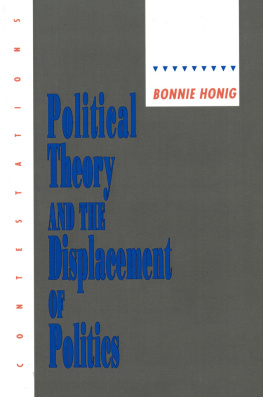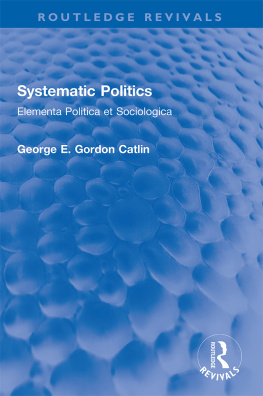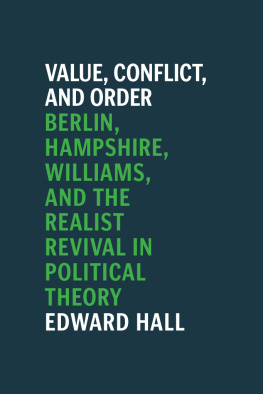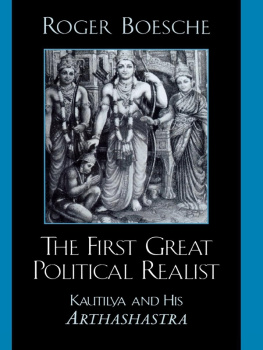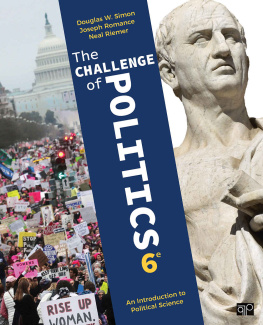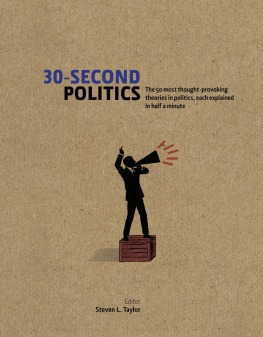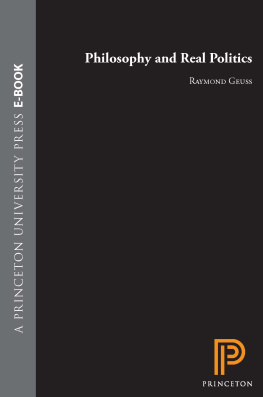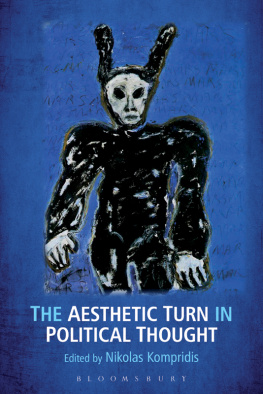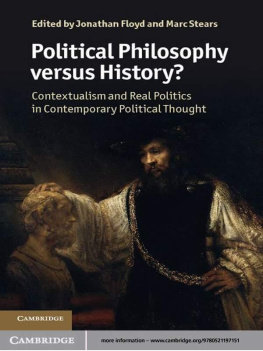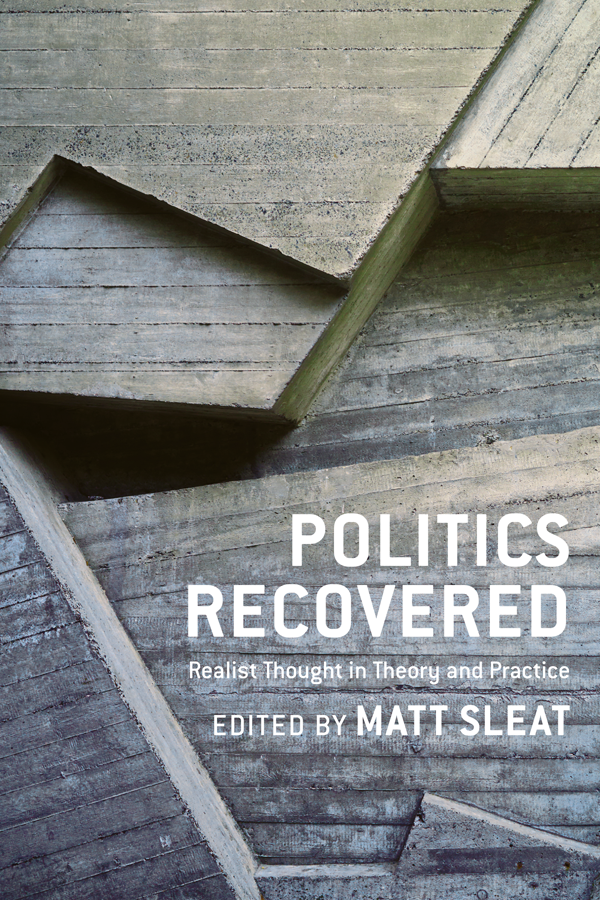Contents
Guide
Pagebreaks of the print version
POLITICS RECOVERED
Politics Recovered

REALIST THOUGHT IN THEORY AND PRACTICE
EDITED BY
Matt Sleat

Columbia University Press
New York
Columbia University Press
Publishers Since 1893
New YorkChichester, West Sussex
cup.columbia.edu
Copyright 2018 Columbia University Press
All rights reserved
E-ISBN 978-0-231-54755-0
Library of Congress Cataloging-in-Publication Data
Names: Sleat, Matt, editor.
Title: Politics recovered : realist thought in theory and practice / edited by Matt Sleat.
Description: New York : Columbia University Press, [2018] | Includes bibliographical references and index.
Identifiers: LCCN 2017030806 (print) | LCCN 2017055329 (ebook) | ISBN 9780231175289 (cloth : acid-free paper)
Subjects: LCSH: Political realism.
Classification: LCC JZ1307 (ebook) | LCC JZ1307 .P55 2018 (print) | DDC 320.01dc23
LC record available at https://lccn.loc.gov/2017030806
A Columbia University Press E-book.
CUP would be pleased to hear about your reading experience with this e-book at .
Cover design: Milenda Nan Ok Lee
Cover image: Shutterstock
In memory of Glen Newey
Contents
Matt Sleat
Charles Larmore
Glen Newey
David Owen
William A. Galston
Paul Sagar
John Medearis
Richard Bellamy
Mark Philp
Rahul Sagar
Alison McQueen
William E. Scheuerman
Duncan Bell
Elizabeth Frazer
Michael Freeden
I thank Wendy Lochner and Christine Dunbar at Columbia University Press for their support and encouragement for this project from its very beginning and their patience toward its end. Most importantly, I must express my gratitude to the contributors, whose commitment and geniality made editing this collection such a satisfying and rewarding experience and from whose work I have learned a great deal.
MATT SLEAT
The Ambitions of Realist Thought
W hen Socrates announces to Callicles in the Gorgias that I am the only one practicing politics among people today, it is hard to imagine that the reader is supposed to take this claim as anything other than ironicthough it is irony with a critical sting. Socrates wants his audience to accept that even those politicians credited with making Athens great, such as the revered Pericles, succeeded only in turning the city into a swollen, festering sore filled with harbors and dockyards and walls and tributes and rubbish of that kind, without a thought for restraint or justice. At best, this ignorance makes laughing stocks of philosophers who attempt to enter into the business of politics; at worst, the failure to recognize that what Socrates calls politics bears no relation to politics as it really is will leave Socrates himself unable to negotiate the realities of political life (and, of course, it is in light of our knowledge that Athens eventually put Socrates to death that we are invited to evaluate his resolve). Where, Callicles asks, is the wisdom in that?
In recent years, something akin to the dialogue between Callicles and Socrates has begun to play itself out once more. The modern Callicles is represented by a renewed interest in political realism. To call a theory realist is to identify a quality of that theory rather than to signify any particular distinguishing content. A realistic theory claims a certain sort of truthfulness or fidelity in relation to its subject matter. One can therefore adopt a realistic position on almost anythingart, morality, literature, science, psychology, and so forththough the demands of realism will differ according to the subject matter. In political philosophy, these demands are given by the character of politics itself. Unsurprisingly, this means that there are different ways in which one can be realistic about politics. This understanding follows quite naturally from the fact that politics is a deeply complex sphere of human activity, involving a plurality of psychologically complex individual and collective agents with a plethora of shifting and often competing interests, beliefs, values, motivations, and goals; counting among its materials power and coercion, on the one hand, and authority and legitimacy, on the other; and standing in a series of multifaceted relationships to other domains of human life such as morality, economics, religion, and technology. We disagree, of course, about what politics is really like, and, indeed, such disagreements are themselves a part of politics that any realistic analysis needs to take seriously (and is an issue that several chapters in this volume reflect upon, most notably those by Newey, McQueen, Frazer, and Freeden). But it is at least clear what these disagreements are about, and it is in this claim to have a more truthful or complete account of politics that the assertion of being realistic is substantiated.
Yet we also differ as to what it would be to respond appropriately to the realities of politics. Together, these disagreements explain why realism is best conceived not as an homogenous theoretical perspective on politicseven less a substantive political position within politicsbut as a family of different approaches to how we ought to understand, theorize, and normatively assess politics. The diversity of topics addressed and approaches represented in this volume attests to the fact that the commitments of a realist can and have been expressed in different and not always compatible ways. And it might prove illuminative to think of these differences in terms of the appropriate ambitions of realist political thought.
A common and in many ways quite natural way of thinking about the aspirations of realism is in terms of its having either descriptive or prescriptive objectives: it wishes to provide either theories that aim at a certain sort of superior descriptive adequacy of the political realm or theories that are in some sense more appropriate guides for agents acting in the political sphere. The result has been to lose sight of too much of what is specific, unique, and indeed valuable about politics. There is clearly value in understanding for its own sake. Yet, as William Galston pithily puts it in his chapter in this volume, Description precedes and constrains prescription. Political realism must begin with and rest on an adequate description of political life. We seek to better understand politics also because we want our theories to do better in terms of helping guide us in practice.
It might be more useful, therefore, to think about the ambitions of realist thought slightly differently, in terms of widening the scope of contemporary political theory, of changing its focus, and of developing an appropriately political normative theory, though recognizing that these ambitions, too, are far from mutually exclusive (as is again well demonstrated in this volume).
One of the least contentious claims of realism has been that Anglo-American political theory over the past several decades has been excessively narrow in the topics it has deemed worthy of exploration. It is only a slight exaggeration to say that the concept of justice has dominated the subdiscipline and that theoretical reflection on almost every political issue of interest has been either funneled through that concept (not necessarily always appropriately) or overlooked because they are not clearly related to it. This situation is both hard to deny and easy to rectify. Realist theory therefore aims to expand the range of topics or questions that theorists address to include those that have either been obscured or wholly overlooked in recent yearssuch as questions about political possibility, political agency, compromise, political judgment, political institutions, and political responsibilityas well as some that are discussed in this volumesuch as corruption (Philp), secrecy (Rahul Sagar), leadership (Bellamy), and the role of the emotions in political life (Galston). Importantly, the claim that political theorists ought to widen the scope of their inquiries is not a claim that they ought to amend how they go about those inquiries (unless, of course, the complaint is specifically about inappropriately interpreting certain issues as issues of justice) but rather a claim that they have focused their attention on too narrow a part of the spectrum of issues that constitute our political experience.



